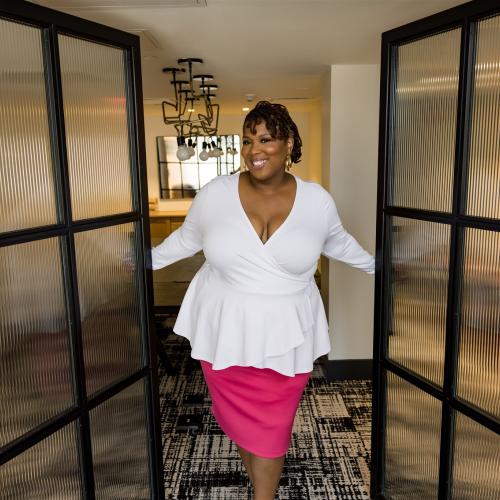Dr. Shareefah Al'uqdah on Local News discussing Minority Mental Health Month. Addressing How African Americans experience depression, anxiety, and grief.
Doctor of Philosophy (Ph.D.)
Counseling Psychology
Howard University
2010

Shareefah N. Al’Uqdah, Ph.D., is a tenured associate professor in the Howard University Counseling Psychology Program. She has a long-standing commitment to improving the lives of individuals and families through mental health initiatives. At North Carolina Central University, she found her passion for psychology earning her bachelor’s and master’s degrees. Following NCCU, she attended and graduated from Howard University with a Ph.D. in counseling psychology. Continuing her tenure at Howard, she serves as an Associate Professor in the APA accredited Counseling Psychology program. Dr. Shareefah not only educates future psychologists, but she also conducts national and international workshops for educators, professionals, and community members on wellness, grief, substance abuse, and implicit bias. Her published research examines issues that impact urban families, urban schools, and African American Muslims.
Al’Uqdah has received over two million dollars in grant funding to help decrease mental health disparities within underserved communities. Outside of the academy, Dr. Shareefah serves as the Founder & Chief Executive Officer of Your Neighborhood Clinic, a not-for-profit organization that provides low cost and insurance-based mental health services. As a loving wife and mother of four wonderful sons, Dr. Shareefah affectionately coined Your Neighborhood Psychologist on social media to highlight her commitment to healing every hood everywhere through mental health awareness and initiatives.
Counseling Psychology
Howard University
2010
Psychology
North Carolina Central University
2004
Psychology
North Carolina Central University
2002
Dr. Al'Uqdah's research has explored the impact of community violence on parenting, parenting stress, and early childhood outcomes. She frequently presents on implicit bias and microaggressions within school systems.
Dr. Al'Uqdah presents on developing cultural competence for working with African American Muslims.
Exploring the role of interpsonal violence and/or community violence on family and children outcomes
Principal Investigator: Awarded HRSA General Pscyhology Education Grant; two years 660,000
Principal Investigator: HRSA Scholarships for Disadvantage Individuals; 5 years; 1.9 million dollars
Awarded for outstanding contributions to the professional development of psychology students from American Psychological Association of Graduate Students, July 2023
Read: Girl Talk HQ | Prioritizing Your Back-To-School Mental Health With Advice From Dr. Shareefah N. Al’Uqdah
Read: The Washington Informer | From Trauma to Transformation: Local Mental Health Advocates Lead New Era in Community Wellness
Impact of Community Violence on Parenting Behaviors and Children’s Outcomes
This study examines community violence exposure as a contextual variable for children’s development. A sample of 57 parents with students enrolled in Head Start programs throughout Washington, DC completed self-report questionnaires on community violence exposure, mental health symptoms, parenting stress, and socialization practices.
African American Muslims: Intersectionality and Cultural Competence
Although African American Muslims constitute 40% of all American‐born Muslims (Pew Research Center, 2011), they are virtually absent from the literature. Increasing the presence of African American Muslims in the literature may improve counselors' cultural competence when working with them. Using intersectional theory, the authors outline the rich history of African American Muslims and highlight ways counselors can improve their cultural and spiritual competence when working with African American Muslims.
Person-Environment Fit, Substance Use Attitudes, and Early Adolescent Substance Use
This study examined the intermediary role of substance use attitudes on the relationship between school racial composition and alcohol and marijuana use in a sample of sixth to eighth graders.
Empowering communities through social media
Multicultural competence is a cornerstone of modern day counseling psychology. The new multicultural and social justice competencies highlight the integration of social justice and multicultural frameworks. These competencies include community engagement through social justice advocacy. Social media may be one way to advocate for social justice for underserved or marginalized communities. Social media networks impact in the Arab Spring and the 2016 United States (U.S.) Presidential election suggests that people may utilize social media to inform and act on their social or political views. Throughout this article, we will explore the benefits of social media for raising critical consciousness, as defined by Freire, and examine how counseling psychologists can utilize social media to engage in social justice advocacy in diverse communities.
From Mourning to Action: African American Women's Grief, Pain, and Activism
The Movement for Black Lives has brought particular attention to the experience of grief in the lives of African American mothers and its use in their advocacy for social reform. Grief-inspired activism is historically significant in the African American community. By highlighting the historical connections between Mamie Bradley Till and present-day African American mothers’ grief over their deceased children, we will discuss the role of grief and mourning in the lives of African American mothers and the way in which their grief is pivotal in shaping their involvement in social justice movements. Furthermore, we will provide suggestions on how to promote social activism among African American mothers.
Dr. Shareefah Al'uqdah on Local News discussing Minority Mental Health Month. Addressing How African Americans experience depression, anxiety, and grief.